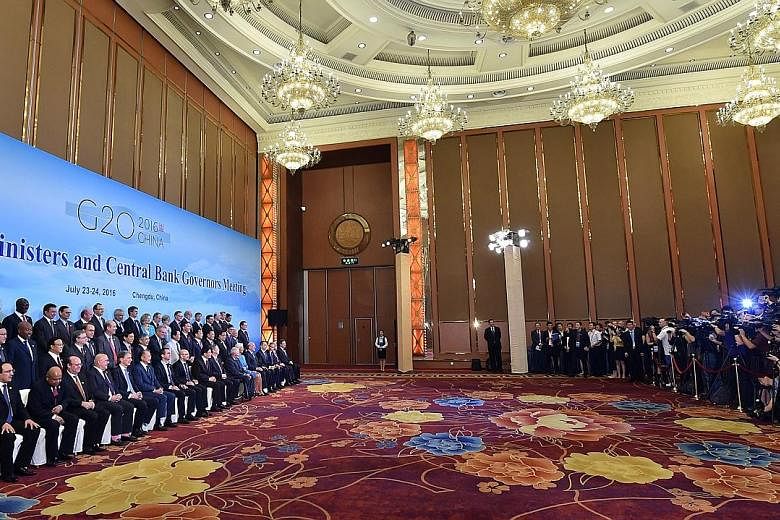Growing incomes for everyone, especially lower-paid workers, is the first priority when thinking of how fiscal policy can promote innovation and growth while favouring an equitable society, said Deputy Prime Minister Tharman Shanmugaratnam.
Such an approach should be taken "before we think of how we can redistribute incomes", Mr Tharman said on Saturday in Chengdu at the G-20 high-level tax symposium during a session moderated by International Monetary Fund managing director Christine Lagarde.
Mr Tharman, who is also Singapore's Coordinating Minister for Economic and Social Policies, was responding to a question by Ms Lagarde on some of the key challenges that governments face in creating a tax system that drives innovation and growth, while reducing inequalities. He was also asked about his own country's experience in implementing policies to create such a tax system.
These questions were also posed to the other panellists, comprising Chinese Finance Minister Lou Jiwei, Italy's Minister of Economy and Finance Pietro Carlo Padoan and South African Finance Minister Pravin Gordhan.
"There are ways in which we can encourage enterprise and innovation without shifting the burden of taxes to the poor or middle class. And ways we can implement a fair and progressive fiscal policy without reducing the incentive for businesses and individuals to innovate, work, grow their incomes and save," Mr Tharman noted.
Elaborating on the first priority, Mr Tharman noted that Workfare, a form of negative income tax for lower-paid workers to encourage them to be part of the workforce, has worked for Singapore.
"It's not just an economic objective, not just about reducing wage inequalities. It is also about ensuring people feel included in society."
Tax credits for employers and subsidies for skills upgrading for both employees and the unemployed are another workable solution, as is giving special support for innovation and productivity among small and medium-sized enterprises.
Property tax is a second priority in tax policy, said Mr Tharman, as it is the least damaging to income growth. He noted that there is scope in many economies to increase taxes on immovable property - land as well as developed real estate - but in a progressive way, such as providing allowance for properties of low value and higher tax rates for properties of high value, as well as making the distinction between owner-occupied residences and investment properties for taxation purposes.
Taxes on property transactions, such as through stamp duties, "have been especially useful in the Asian context, where speculation in the property market is almost a habit".
While these taxes can be varied depending on the state of the property cycle, "they are also an essential part of the permanent landscape of taxes - always distinguishing purchases for owner-occupation from those for investment".
His remarks suggested that some cooling measures such as the additional buyer's stamp duty - levied on foreign home buyers and Singaporeans who own more than one residential property here - could become a permanent feature.
A third priority is in ensuring fair subsidies for public services, targeted at those who need it most, said Mr Tharman, noting that healthcare financing is especially challenging in more mature societies and those which are getting older.
"Fair and targeted subsidies are at the heart of ensuring both social equity and sustainable budgets - and if we don't address this well, we will see taxes go up even more as our societies age," he warned.
A fourth priority is to mitigate the regressive feature of consumption taxes - goods and services tax (GST) or value-added tax.
"They are efficient taxes but, on their own, they hurt the poor more. That's why in most countries we try to offset their impact on the poor."
One way is to provide benefits directly to the poor rather than exclude items from the tax.
For example, Singapore has implemented the GST Voucher scheme to help the less well-off pay for certain expenses such as utilities, and service and conservancy charges to mitigate the impact of the GST on the poor.
A dollar cap on total income tax deductions, which the Government introduced in the Singapore Budget this year, is a fifth priority.
"As the OECD (Organisation for Economic Cooperation and Development) points out, those who get the most benefit from some tax allowances are the rich and, in many countries, we need a way to cap total tax deductions so as to preserve the progressivity of income tax," said Mr Tharman.

